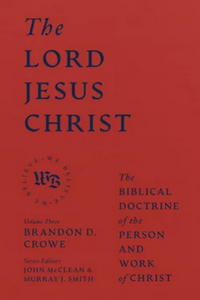 The Lord Jesus Christ:
The Lord Jesus Christ:
The Biblical Doctrine of the
Person and Work of Christ
DETAILS: Series: We Believe Series, Volume Three Publisher: Lexham Academic Publication Date: October 18, 2023 Format: Hardcover Length: 316 Read Date: July 21-August 18, 2024

What’s The Lord Jesus Christ About?
It’s a work on Christology–from Scriptural, historical, and systematic theological perspectives.
That seems a bit too pithy, but the few times I’ve tried that paragraph before now have really gone on and on. So–as I so often do when I’m struggling to answer this question–I’m just going to borrow from the Publisher’s description:
Jesus is the divine Son of God who has taken on human nature in the incarnation. As prophet, priest, and king, he leads his people in a new exodus. In The Lord Jesus Christ, Brandon D. Crowe reflects on Christ’s person and work. Crowe traces christological concerns throughout the Old and New Testaments and church history and then presents systematic and practical implications. Through a combination of biblical, historical, and theological study, Crowe provides a fresh and robust statement of who Christ is and what he has done.
Written from a confessionally Reformed perspective in dialogue with the great creeds of the church, The Lord Jesus Christ provides a thorough and trustworthy guide to understanding Jesus and his salvific work.
Breaking Things Down a Bit
I think a glance at a Table of Contents really gives an idea what the book is like and what Crowe’s approach to this is (I included page numbers for each part to show the weight he gives to each area)
Introduction: “Who Do You Say That I Am?”
Part 1: The Biblical Witness [pg. 9-146]
I. The Son of God in Creation and the Old Testament
II. The Son of God Promised in the Prophets
III. The Son of God in the Gospels
IV. The Son of God in Acts and Paul’s Letters
V. The Son of God in Hebrews to Revelation
Part 2: Dogmatic Development [pg.147-294]
VI. Pre-Nicene Christology
VII. Creedal, Conciliar, and Modern Christology
VIII. The Mediator of the Covenant of Grace
IX. The Unity of the Mediator
X. The Work of the Mediator
XI. The Centrality of Christology for Christian Dogmatics
Part 3: Truth for Life and Mission [pg. 295-310]
XII. The Gospel of Grace
XIII. Pluralism and the Uniqueness of Christ
Conclusion: Seven Theses on the Person and Work of Christ
While Parts 1 and 2 are about even in page length, you will realize that the meat of the book is found in The Biblical Witness. The Dogmatic Development part is by no means lightweight, but it is easier to get through. I was a little surprised once I got there at how brief the last Part was–but it didn’t need to be longer to wrap up and apply the previous Parts.
Going Beyond this Work
Crowe is clear that this book isn’t supposed to be an end to one’s Christological reading, but it’s a start. In addition tote helpful footnotes and citations throughout, he concludes each chapter with four or so recommendations for further reading (not all will agree with a lot of Crowe’s arguments). I don’t know that I’m going to follow up with all of them (narrator: he will not), but I am going to chase down some of those works.
Each chapter ends with a clearly designated conclusion, so you can be sure you’re picking up on those parts that Crowe finds most important, which is a very handy little segment. As are the Seven Theses he ends the book with–undoubtedly for me and others, this is going to be the part of the book that gets referred to most often. You can get a quick look at a significant point to brush up on it or refresh your memory, before going back to the appropriate chapter (or chapter conclusion) to get the details you need.
So, what did I think about The Lord Jesus Christ?
This is presented in a text-book style but isn’t quite as dry as one. But I can easily see it functioning as one (and being a favorite of the students using it because of that style).
It took me longer to get through than I anticipated–which is not a bad thing, it just wasn’t what I expected. It is not a difficult read by any means (I can point to other words by Crowe that would fit that description better), but because of the comprehensiveness it’s shooting for, you do have to exercise the gray matter a little as you read.
It’s not polemic at all, and almost every controversy it tackles has been settled in the creedal tradition for centuries, so it won’t rankle any Trinitarian as they read their way through it (although this book, like the rest of the series, is firmly within the Confessional Reformed tradition and demonstrates it). Crowe shows not only a familiarity with contemporary–and older–Biblical scholarship, but is just as adept at bringing in major writers from Church History through today to weigh in on the Dogmatic Development sections.
All in all, this was an outstanding book, one that I will return to as a reference (and likely re-read in a couple of years). It’s also a great advertisement for the rest of the series, and I anticipate adding the rest of them to my shelves in short order (well, as short as I can–it doesn’t look like Lexham Press is really rushing to put them out).
Whether or not you grab them all, if you want a solid and accessible stand-alone Christology you’d be well served to turn to Brandon Crowe.

This post contains an affiliate link. If you purchase from it, I will get a small commission at no additional cost to you. As always, the opinions expressed are my own.
![]()


